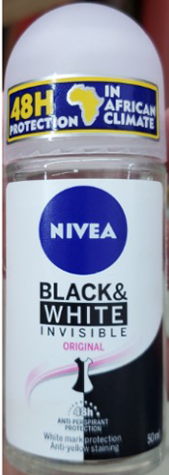Harmful Chemical in the Batch of Nivea Can Cause:
- cancer 2. Harm unborn children 3. Cause skin irritation 4. Affect Reproductive organs
The National Agency for Food and Drug Administration and Control (NAFDAC) has issued a recall alert for Nivea BLACK & WHITE Invisible Roll-On Deodorant due to the presence of harmful chemical content.


On Thursday, NAFDAC disclosed in Public Alert No. 041/2024 that the recall pertains to the 50ml version of Nivea BLACK & WHITE Invisible Roll-On Deodorant, which was identified through the European Union’s rapid alert system for dangerous non-food products (RAPEX) in Brussels.
The agency stated that the recalled product contains 2-(4-tert-Butylbenzyl propionaldehyde (BMHCA), a chemical that is prohibited in cosmetic products because of its potential to cause reproductive harm, impair fetal health, and induce skin irritation and burns in users.
The product, manufactured in Germany, is labelled as offering “48H protection in African climate” and is associated with batch number 93529610 and barcode 42299882.
NAFDAC advises importers, distributors, retailers, and consumers to exercise caution and vigilance within the supply chain to prevent the importation, distribution, sale, and use of the affected Nivea Roll-On with the specified batch number.
Nivea BLACK & WHITE Invisible Roll-On Deodorant is a widely recognized personal care product available globally.
Important Information for Consumers
Members of the public who possess the affected batch of this product should cease its sale and use and return any stock to the nearest NAFDAC office. Healthcare professionals and consumers are encouraged to report any adverse events related to the use of regulated products to the nearest NAFDAC office via pharmacovigilance@nafdac.gov.ng, through the E-reporting platforms available at www.nafdac.gov.ng, or by using the Med-Safety application, which can be downloaded from Android and iOS stores.
2-(4-tert-Butylbenzyl propionaldehyde (BMHCA), also known as Butylphenyl Methylpropional or Lilial, is a synthetic fragrance compound commonly used in cosmetics, perfumes, and personal care products to provide a floral scent. However, it has raised safety concerns due to its potential health risks.
Research has linked BMHCA to reproductive toxicity, suggesting it may negatively affect fertility and fetal development. Additionally, it can cause skin irritation, sensitivity, and allergic reactions. As a result, regulatory bodies, including the European Union, have classified BMHCA as a Substance of Very High Concern (SVHC) and banned its use in cosmetics and personal care products since March 2022.
In recent years, manufacturers have reformulated products to exclude BMHCA in response to growing consumer awareness regarding safe ingredients and the implementation of stricter regulations.






























